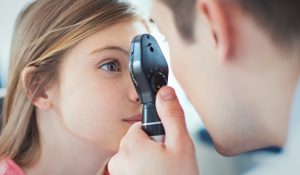 This August is Children’s Eye Health and Safety Month, a time to learn more about some of the most common problems affecting children’s vision and ways to prevent and treat those conditions.
This August is Children’s Eye Health and Safety Month, a time to learn more about some of the most common problems affecting children’s vision and ways to prevent and treat those conditions.
According to the CDC, about 1 in every 4 children in the United States suffers from an undiagnosed eye health problem. These issues come in a wide variety of different forms, but some are more frequent than others, including:
Strabismus: This condition causes crossed eyes, preventing both eyes from focusing on the same object.
Amblyopia: Also known as “lazy eye,” amblyopia disrupts communication between the brain and the affected eye, leading to a greater reliance on the stronger eye and deteriorating vision in the affected eye.
Blurred vision: This issue can result from a few different conditions, including refractive errors like myopia (nearsightedness), hyperopia (farsightedness), or astigmatism (a misshapen cornea). Convergence insufficiency can also blur your child’s vision when looking at an object up close.
Binocular vision dysfunction (BVD): This problem occurs when your child’s eyes are misaligned and failing to work together, leading to symptoms like double vision and light sensitivity.
Nystagmus: As many as 1 in 1,000 school-aged children suffer from nystagmus, which causes uncontrollable eye movements that may lead to dizziness, balance problems, and shaky vision.
You can prevent these problems from negatively impacting your child’s quality of life in a few different ways, including getting recommended vision screenings during your child’s regular checkups with a pediatrician or other healthcare professional.
If any signs of an eye health issue are found during a vision screening, an eye exam by an ophthalmologist or optometrist can more accurately diagnose the cause of that problem and help create an effective treatment plan. Protective eyewear, adequate sleep, and limited screen time also go a long way toward preserving your child’s eye health.
To schedule an appointment at Jamaica Hospital Medical Center’s Ophthalmology Department, please call 718-206-5900.
All content of this newsletter is intended for general information purposes only and is not intended or implied to be a substitute for professional medical advice, diagnosis or treatment. Please consult a medical professional before adopting any of the suggestions on this page. You must never disregard professional medical advice or delay seeking medical treatment based upon any content of this newsletter. PROMPTLY CONSULT YOUR PHYSICIAN OR CALL 911 IF YOU BELIEVE YOU HAVE A MEDICAL EMERGENCY.
